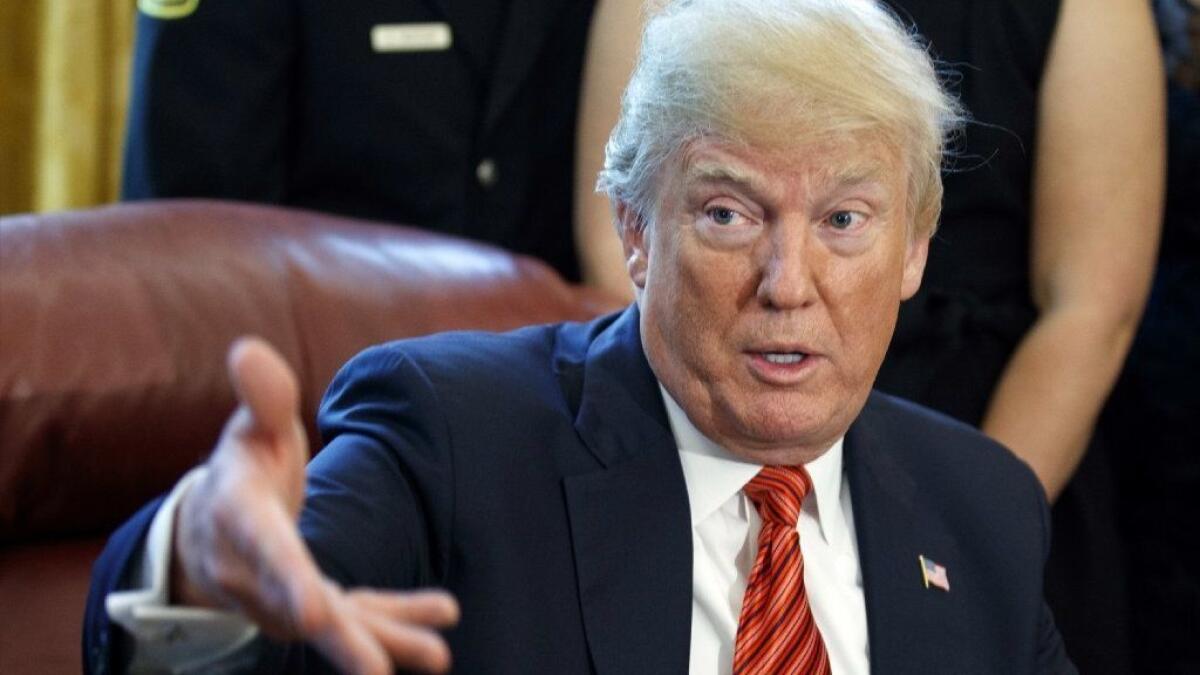Trump often characterizes things — such as DACA and Obamacare — as ‘dead.’ Is that right?

- Share via
The tweets are nothing new, coming at all hours and sometimes dozens in a single weekend.
President Trump announces policy, castigates critics and touts allies in 280 characters. Amid the onslaught of tweets, a theme of sorts has emerged when Trump disagrees with something: He says it’s “dead.”
But when Trump makes these proclamations — an effort of sorts to show disregard for people, policy or organizations and dismiss their importance — it does not necessarily mean the person or organization is on life support or worse.
Here’s a look at a few of the things Trump has called “dead,” along with a reality check regarding their status.
The White House Correspondents’ Dinner
Reality check:
While the White House Correspondents’ Assn. dinner on April 28 received criticism for comedian Michelle Wolf’s roast of White House Press Secretary Sarah Huckabee Sanders and many others, the annual gathering is not dead.
The event, which honors journalists and awards scholarships to students, began in 1921 and is expected to be held next year. Trump did not attend the dinner this year or last year, but he did attend before becoming president.
It’s not unusual for the association to hire a comedian to roast the president, his Cabinet, members of the press and news organizations. At times, the administration, and even some in the media, express outrage over the jokes.
In response to the jokes from this year’s dinner, the association, which was founded in 1914, issued a statement, saying, in part, that Wolf’s roast was not “in the spirit” of the group’s mission to promote a free press and civility.
Obamacare
Reality check:
Well, it’s not dead. In fact, nearly 11.8 million Americans signed up for 2018 health coverage through marketplaces created by the Affordable Care Act — commonly known as Obamacare — according to the Centers for Medicare and Medicaid Services. This total was a slight dip compared to last year’s numbers and comes as Republicans and Trump continuously assail the Obama administration’s 2010 signature healthcare law. Throughout the 2016 election, Trump vowed to repeal and replace Obamacare. Yet that has not happened.
Last year, the Republican-controlled Congress failed to repeal Obamacare, as the GOP had planned. A poll released in March by the nonpartisan Kaiser Family Foundation showed that 54% of the public has a favorable view of the law, compared to 42% who have an unfavorable view. It’s the highest favorable rating since the group began polling on the healthcare law in 2010.
Attorney–client privilege
Reality check:
This tweet came shortly after the FBI raided the offices of Michael Cohen, Trump’s personal lawyer. The raid last month stemmed from special counsel Robert S. Mueller III’s ongoing investigation into possible collusion between the Trump campaign and Russians in the 2016 presidential election. Of course, attorney-client privilege still exists, and Trump certainly knows so. It allows clients who have a legal problem to talk candidly with a lawyer. However, there are limitations. The “crime fraud exception” notes that if a person is using the attorney-client relationship to perpetrate a crime, there is no privilege.
“You have a right to talk in confidence with your attorney about criminal activity, but you can’t use your attorney to accomplish a crime,” David Cole, legal director for the American Civil Liberties Union, recently wrote on the group’s website. “A mobster suspected of engaging in bribery can consult his attorney about the facts of his alleged bribery without fear that the attorney will disclose those communications. But he has no right to have the lawyer deliver the bribe for him.”
DACA
Reality check:
In September, Trump ordered an end to Deferred Action for Childhood Arrivals, an Obama-era program that shields young immigrants who are in the country illegally from deportation. He called on Congress to act by a March deadline, but no legislation came about. Even so, immigrant rights groups have filed a barrage of lawsuits to keep the program operating.
To date, three federal judges have ruled against the administration’s efforts to end the program. In April, in the latest ruling, U.S. District Court Judge John Bates called the administration’s decision to end DACA “virtually unexplained” and therefore “unlawful.”
Collusion
Reality check:
Trump’s tweet came in response to the release of a Republican House memo focused on FBI intelligence practices during the 2016 election. The partisan memo has been assailed by Democrats and lauded by Republicans. While Trump said the memo vindicates him in the Mueller probe, that investigation remains ongoing, exploring, among other things, possible collusion.
Ted Cruz and John Kasich
Reality check
This tweet foreshadowed what was to come, regardless of the mathematical lives at the time of the presidential campaigns by Texas Sen. Ted Cruz and Ohio Gov. John Kasich. After racking up several victories in the Republican primaries, Trump sought to clear the remaining field with this message. Less than a week after it was sent, both Cruz and Kasich ended their campaigns.
In July 2016, Trump secured the Republican presidential nomination at the party’s convention in Cleveland, before going on to defeat Democrat Hillary Clinton in the general election in November.
More to Read
Sign up for Essential California
The most important California stories and recommendations in your inbox every morning.
You may occasionally receive promotional content from the Los Angeles Times.











